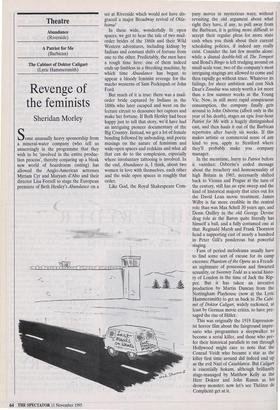Theatre Abundance (Riverside) A Patriot for Me (Barbican) The Cabinet
of Doktor Caligari (Lyric Hammersmith)
Revenge of the feminists
Sheridan Morley
Some unusually heavy sponsorship from a mineral-water company (who tell us unnervingly in the programme that they wish to be 'involved in the entire produc- tion process', thereby conjuring up a bleak new world of boardroom casting) has allowed the Anglo-American actresses Myriam Cyr and Maryam d'Abo and their director Lisa Forrell to stage the European premiere of Beth Henley's Abundance on a set at Riverside which would not have dis- graced a major Broadway revival of Okla- homa!
In these wide, wonderfully lit open spaces, we get to hear the tale of two mail- order brides of the 1860s and their Wild Western adventures, including kidnap by Indians and constant shifts of fortune from one to the other. Predictably, the men have a rough time here: one of them indeed ends up limbless in a threshing machine, by which time Abundance has begun to appear a bloody feminist revenge for the macho westerns of Sam Peckinpah or John Ford.
But much of it is true: there was a mail- order bride captured by Indians in the 1880s who later escaped and went on the lecture circuit to denounce her captors and make her fortune. If Beth Henley had been happy just to tell that story, we'd have had an intriguing pioneer documentary of the Big Country. Instead, we get a lot of female bonding followed by unbonding, and poetic musings on the nature of feminism and wide-open spaces and redskins and what all that can do to the complexion, especially where involuntary tattooing is involved. In the end, Abundance is, I think, about two women in love with themselves, each other and the wide open spaces in roughly that order.
Like God, the Royal Shakespeare Com- pany moves in mysterious ways; without revisiting the old argument about what right they have, if any, to pull away from the Barbican, it is getting more difficult to accept their regular pleas for more state cash when you think about their current scheduling policies, if indeed any really exist. Consider the last few months alone: while a dismal double-bill of The Tempest and Bond's Bingo is left trudging around on small-scale tour, two of the company's most intriguing stagings are allowed to come and then rapidly go without trace. Whatever its failings, for sheer ambition and cost Nick Dear's Zenobia was surely worth a lot more than a few summer weeks at the Young Vic. Now, in still more rapid conspicuous consumption, the company finally gets around to John Osborne (albeit only in the year of his death), stages an epic four-hour Patriot for Me with a hugely distinguished cast, and then hauls it out of the Barbican repertoire after barely six weeks. If this makes artistic or commercial sense of any kind to you, apply to Stratford where they'll probably make you company manager.
In the meantime, hurry to Patriot before it vanishes: Osborne's coded message about the treachery and homosexuality of high Britain in 1965, necessarily shifted back to Vienna and Prague at the turn of the century, still has an epic sweep and the kind of historical majesty that cries out for the David Lean movie treatment. James Wilby is far more credible in the central role than was Max Schell 30 years ago, and Denis Quilley in the old George Devine drag role as the Baron quite literally has himself a ball, and a fully costumed one at that. Reginald Marsh and Frank Thornton head a supporting cast of nearly a hundred in Peter Gill's ponderous but powerful staging.
Fans of period melodrama usually have to find some sort of excuse for its camp excesses: Phantom of the Opera as a Freudi- an nightmare of possession and thwarted sexuality, or Sweeney Todd as a social histo- ry of London in the time of Jack the Rip- per. But it has taken an inventive production by Martin Duncan from the Nottingham Playhouse (now at the Lyric Hammersmith) to get us back to The Cabi- net of Doktor Caligari, widely reckoned, at least by German movie critics, to have pre- saged the rise of Hitler.
This was originally the 1919 Expression- ist horror film about the fairground impre- sario who programmes a sleepwalker to become a serial killer, and those who pre- fer their historical parallels to run through Hollywood might care to note that the Conrad Veidt who became a star as the killer first time around did indeed end up as the evil Nazi of Casablanca. But Caligari is essentially hokum, although brilliantly stage-managed by Matthew Kelly as the Herr Doktor and John Ramm as his drowsy monster; now let's see Theatre de Complicite get at it.


















































































 Previous page
Previous page